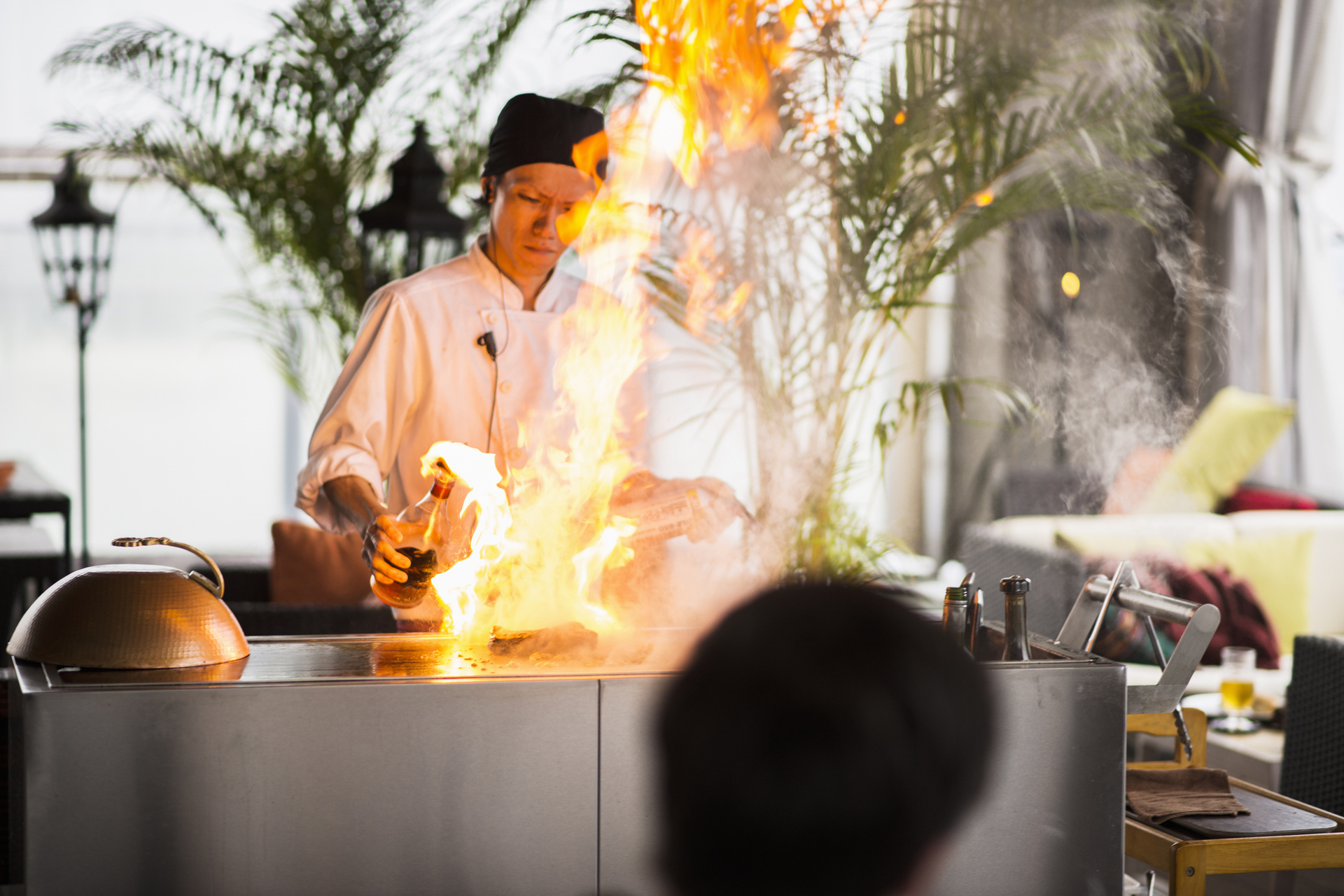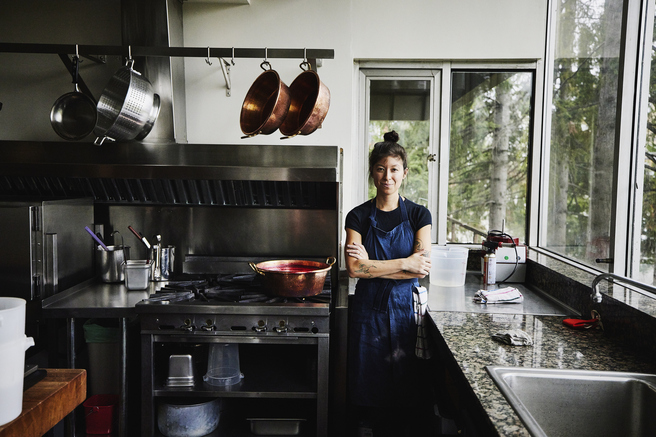The highest paying jobs with a culinary degree

If you’ve ever considered working in the culinary field, you’ve probably looked at which are the highest-paying jobs.
With more than 13.9 million people working in the US food service industry with an average salary of only $29,250, it’s clearly a competitive field and those in it are always looking for ways to get ahead.
Pursuing a degree in the culinary arts can hone skills in the kitchen and open doors to more lucrative career opportunities in the kitchen.
From executive chefs at renowned restaurants to food scientists shaping the future of cuisine, explore some of the highest-paying jobs available to graduates with a culinary degree.
Top highest paying jobs for culinary degree holders
There are many different roles in the culinary field that command high salaries. Let's look at some of the more lucrative opportunities.
| Job | Average Annual Salary | Key Responsibilities | Industry Focus |
|---|---|---|---|
| Executive Chef | $95,302 | Menu development, kitchen operations, staff management | Restaurants, Hotels |
| Food Service Director | $102,175 | Culinary strategy, menu planning, budget management | Corporate, Institutions |
| Food Science Manager | $119,148 | R&D, quality control, scientific innovation | Manufacturing, Research |
| Culinary Consultant | $85,952 | Strategic advice, operational optimization, trend analysis | Independent Consulting |
| Personal Chef | $88,659 | Personalized menus, exclusive dining experiences | Private Service |
| Food Stylist | $66,769 | Food photography setup, visual presentation | Media, Advertising |
Executive chef: the culinary leader
At the top of the gastronomic hierarchy, executive or head chefs command big salaries by overseeing entire kitchen operations, from menu development to staff management.
Their role requires exceptional culinary skills and strategic business acumen to maintain the quality standards and profitability of high-end restaurants and hotels.
Executive chefs can expect to earn roughly $95,302 annually.
Food service director
Responsible for developing and executing culinary strategies that align with a company’s goals and meet customer expectations.
Food service directors oversee menu planning, food preparation and presentation, paying attention to dietary guidelines, nutritional standards and safety regulations.
Collaborating closely with chefs, kitchen staff and procurement teams, they manage food sourcing, inventory control and budget management to optimize operational efficiency and profitability.
Food service managers and directors can earn an average annual salary of $102,175.
Food science manager: innovation in food technology
This role focuses on bridging the gap between culinary artistry and scientific innovation.
Food science managers lead research and development teams, exploring new flavors, ingredients and food cooking or preservation techniques.
With a focus on quality control and regulatory compliance, they play an important role in shaping the future of food production and consumer health.
A food science consultant can expect to earn on average $119,148 per year.
Culinary consultant: shaping food businesses
These professionals use their expertise to advise restaurants, hotels and food manufacturers on menu development, kitchen efficiency and culinary trends.
They provide strategic insights to optimize operations, improve customer experiences and drive profits, often commanding high fees for their specialized knowledge and industry insights.
A culinary consultant can earn an average of $85,952 a year.
Personal chefs: exclusive culinary services
These private cooks cater to affluent individuals, celebrities and households, delivering high-end personalized dining experiences while maintaining a flexible schedule to accommodate their clients' needs.
They create bespoke menus, accommodate dietary preferences and deliver exceptional culinary experiences in exclusive settings.
Private chefs enjoy high salaries, with an annual average of $88,659, as well as interesting perks.
Food stylist: artistry on the plate
Creative culinary professionals who meticulously craft visually appealing dishes for photography, film and media.
Food stylists ensure every detail, from food placement to garnishing, improves the aesthetics and appeal of food products, cookbooks and advertisements.
Their ability to create stunning visual narratives through food earns them substantial compensation, with an average of $66,769 per year.
Other careers with a culinary degree
Graduates in the culinary arts frequently progress to a wide range of well-paid careers beyond traditional kitchen roles.
Some alternative career paths for people who attend culinary schools are:
-
Culinary educator: teachers who help aspiring chefs and culinary students in academic settings, cooking schools or community education programs. They share their expertise in cooking techniques, food safety, nutrition and culinary arts, inspiring the next generation of professionals
-
Food writer or critic: discerning individuals who explore dining experiences through writing, reviewing restaurants, creating food blogs or contributing to culinary publications. They offer insights, critiques and recommendations that shape trends and influence dining choices
-
Food entrepreneur: people who launch their own food businesses, such as restaurants, food trucks, catering companies or artisanal food makers. They combine culinary creativity with business skills to create unique foodstuffs or dining experiences
-
Research and development chef: experts who work in food manufacturing companies developing new recipes, products and flavors. They blend culinary artistry with food science to innovate and improve food products
-
Nutrition consultant: health-focused professionals who provide dietary guidance, meal planning and nutritional counseling to clients, including individuals, athletes or healthcare facilities. They apply culinary knowledge to promote wellbeing through balanced and nutritious diets
Event planner with culinary focus: coordinate food and beverage services for weddings, corporate events or festivals.
They collaborate with chefs, caterers and vendors to create memorable dining experiences that align with event themes and client preferences

How a culinary degree prepares you for high-paying culinary roles
Earning a cooking arts degree equips individuals with the comprehensive skillsets and industry knowledge essential for pursuing lucrative careers in the culinary world.
On a culinary degree course, you will develop:
-
Technical proficiency: culinary programs emphasize hands-on training in cooking techniques, food preparation and kitchen management. Graduates gain proficiency in creating interesting cuisines, mastering knife skills and understanding the principles of food safety and sanitation. This technical expertise forms the foundation for success in demanding culinary environments
-
Creativity and innovation: courses encourage experimentation with flavors, textures and presentations. Students learn to develop unique recipes, adapt to dietary preferences and incorporate seasonal ingredients creatively. This creative agility is important for chefs and culinary professionals who aspire to innovate and stay ahead in a competitive industry
-
Business knowledge: many culinary programs include culinary management, menu planning and restaurant operations coursework. On these, you will learn about cost control, budgeting and inventory management, all essential skills for managing kitchen finances and ensuring profitability. Business acumen is particularly valuable for executive chefs, directors and culinary consultants
-
Culinary arts and culture: studies often include gastronomy, food history and global cuisines. Students explore cultural influences on food traditions, regional cooking styles and culinary trends worldwide, which improves their ability to create authentic and culturally relevant dishes. It also helps them appeal to a mix of clientele and broaden their career opportunities in culinary tourism and international cuisine
-
Communication: courses emphasize teamwork, kitchen leadership and customer service, preparing graduates to lead kitchen brigades, collaborate with varied teams and provide exceptional dining experiences
Adaptability and professionalism: the nature of the culinary industry means those working in it have to be adaptable and maintain high standards of professionalism.
Culinary programs instill a strong work ethic in students while teaching them time management skills and developing their ability to thrive under pressure
Other requirements for high-level culinary careers
Achieving success in this kind of career goes beyond formal education and technical skills.
Let’s look at some of the additional requirements and attributes essential for aspiring professionals:
-
Experience and practical training: while a culinary degree provides foundational knowledge, hands-on experience is invaluable. Entry-level positions in kitchens and internships in renowned establishments provide practical skills and industry insights
-
Continuing education and specialization: culinary professionals often pursue advanced courses or extra training to deepen their expertise in specific areas. Further education in areas such as pastry arts, nutrition or sommelier studies boost career prospects and keeps skills up to date
-
Networking and industry connections: building a support structure of contacts is vital for career advancement. Networking opportunities through culinary events, industry associations and mentorship programs provide insights, career advice and potential job options
-
Financial management skills: proficiency in budgeting, cost control, menu engineering and profitability analysis helps you manage kitchen operations effectively and contributes to financial success
-
Adaptability and innovation: the culinary landscape is constantly seeing changing consumer preferences, dietary trends and technological advancements. Professionals must be adaptable and continuously update their skills to remain competitive and meet industry demands
-
Leadership and team management: high-level culinary careers often involve leading kitchen teams, managing staff and building a positive work environment. Strong leadership skills and the ability to inspire and motivate others are essential for success in managerial roles
-
Commitment to quality and customer satisfaction: high-achieving professionals must prioritize guest satisfaction, uphold food safety standards and strive for culinary excellence in every aspect of their work
Reaching high-level culinary careers without a degree
Landing top-level culinary careers without a formal degree is harder, but it can be done through gaining practical experiences and following alternative pathways.
Apprenticeships under seasoned chefs or extensive on-the-job training in roles such as station chef or pastry chef can provide vital culinary skills and help develop your leadership qualities.
Pursuing specialized certifications in areas such as pastry arts demonstrates commitment to professional growth and helps develop expertise.
Networking with industry professionals and seeking mentorship from established chefs can provide guidance and eventually lead to valuable career opportunities.
If you broaden your work experience across various culinary settings, this develops your adaptability, customer service skills and understanding of industry dynamics. All of these can help you reach your culinary goals.
Additionally, entrepreneurship in ventures such as catering or food trucks is an option for people who want to follow their own path in the culinary world.
Conclusion
Pursuing a culinary degree opens up a world of varied and rewarding career opportunities in the kitchen and beyond.
From executive chefs leading prestigious restaurants to innovative roles in food science and culinary management, the industry offers many pathways to success.
For passionate individuals, financial rewards can be achieved whether exploring niche culinary careers, leveraging culinary expertise in non-traditional roles or embracing entrepreneurial ventures.
Graduates with a culinary degree are well-equipped to thrive in this competitive field.
By combining technical skills, creativity, business know-how and a commitment to culinary excellence, professionals can forge fulfilling careers that blend their love of food with rewarding work.
If you want to get started in a food industry career, see how a degree from a French culinary institute such as Ecole Ducasse can help.


